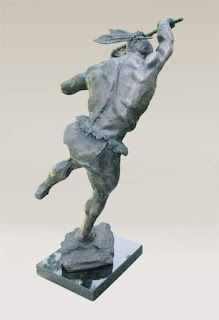 |
| Detail from “The School of Athens” a fresco by Raphael (1483 – 1520) [Click image to call up all published instalments] |
While seeking inspiration among the many art pieces at the former National Art Museum of Sports (NAMOS) in Indianapolis, I came across a sculpture of a Native American engaged in a game with a netted stick.
I reached out to the artist Frederick Kail, who provided front and back photos of the original piece, titled “Attack!” (shown below). He is also known for making the trophy given annually to the top men’s and women’s Lacrosse players, and the famous “Joe Jolter” statues that were the first licensed figure of the NFL, back in 1961.
 |  |
The Native American sculptures depict players of the game of Tewaaraton, translated from the Mohawk language as “little brother of war.”
The sport was a way to keep their warriors in shape, to settle disputes between tribes, and for the pleasure of the Creator. Games were spread out sometimes across miles and, though it was a better way to resolve disputes than full-scaled war against a neighboring tribe, there were many injuries and deaths across the field of play. The game was played among the Iroquois people and was developed into what we today know as LaCrosse.
In 2008, former Indiana Poet Laureate Joyce Brinkman assembled several of her creative friends to walk through this museum for an Ekphrastic project called Sporting Words. I had the pleasure of participating and came away with five pieces. Two have been shared here in previous posts (“A Bad Day for Casey” and “Angel in the Corner”). Here is the third, entitled “Tewaaraton.”
Tewaarathon
Father would tell
of a three day battle
and four hundred men
in fierce competition,
many casualties,
but only three deaths—
one when a young brave
was struck with the rock
upon his temple—
a glorious contest
for the pleasure of our creator.
Today,
I will show my new son
the honor of
combat on the pitch,
will prove to my daughters
their father is strong and
will protect them from harm,
then, too, for my wife—
she will see that she made
a wise choice—
a fine warrior husband.
And father, please know
that I was listening
to your stories.
I will honor you
with the netted stick,
a warrior to the glory
of our great people,
knowing you are still here,
still watching
from the bent grass,
from the swaying trees,
from the clouds above
as they cross the field of play.
The sport was a way to keep their warriors in shape, to settle disputes between tribes, and for the pleasure of the Creator. Games were spread out sometimes across miles and, though it was a better way to resolve disputes than full-scaled war against a neighboring tribe, there were many injuries and deaths across the field of play. The game was played among the Iroquois people and was developed into what we today know as LaCrosse.
In 2008, former Indiana Poet Laureate Joyce Brinkman assembled several of her creative friends to walk through this museum for an Ekphrastic project called Sporting Words. I had the pleasure of participating and came away with five pieces. Two have been shared here in previous posts (“A Bad Day for Casey” and “Angel in the Corner”). Here is the third, entitled “Tewaaraton.”
Tewaarathon
Father would tell
of a three day battle
and four hundred men
in fierce competition,
many casualties,
but only three deaths—
one when a young brave
was struck with the rock
upon his temple—
a glorious contest
for the pleasure of our creator.
Today,
I will show my new son
the honor of
combat on the pitch,
will prove to my daughters
their father is strong and
will protect them from harm,
then, too, for my wife—
she will see that she made
a wise choice—
a fine warrior husband.
And father, please know
that I was listening
to your stories.
I will honor you
with the netted stick,
a warrior to the glory
of our great people,
knowing you are still here,
still watching
from the bent grass,
from the swaying trees,
from the clouds above
as they cross the field of play.
| Copyright © 2023 by Maik Strosahl Michael E. Strosahl has focused on poetry for over twenty years, during which time he served a term as President of the Poetry Society of Indiana. He relocated to Jefferson City, Missouri, in 2018 and currently co-hosts a writers group there. |

Maik, I never really thought about the origins of the game LaCrosse, never thought of it at all, actually. Unlike you, who think of so many things, in awe and inspiration!
ReplyDeleteAbsolutely cool story, I like how the speaker is honoring his father, and where he thinks of his dead father as watching from. Great imagery and emotional evocation. And it's true, that tribes engaged in sports encountered injury and death; in some cases folks weren't satisfied without it. The Gaelic game of hurley was something between soccer and field hockey, and it had upright goalposts like American football. The game, instead of a battle, could decide who got a piece of bottom land or a particular bride. There would always be sore losers, but if you'd taken out one or two of their guys it was surely a consolation.
ReplyDelete